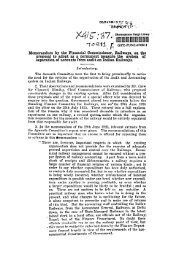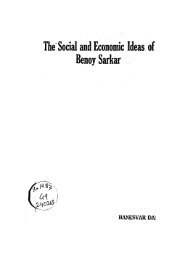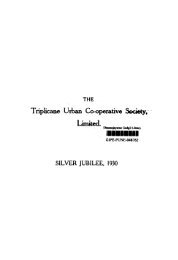You also want an ePaper? Increase the reach of your titles
YUMPU automatically turns print PDFs into web optimized ePapers that Google loves.
I<br />
3 1 4 INDtAN opiNION December 4th, 1925<br />
argue that ethics and principles of action are poles<br />
apart and that what is ethical need not necessarily<br />
be expedient and that action reqnires a practical<br />
mind which Sees only its own side of the picture<br />
and refnses to see reason on the other side. These<br />
sentiments are voiced by the nationalist press which<br />
make it an every-day grievance of their existence<br />
that the Anglo-Indian and the civilian bnreancrat<br />
refuse to ilee the reason of the Swaraj movement.<br />
How contradictory does this pOile appear with the<br />
role of practical men they adapt where Sastri is<br />
concerned? If Indians are to subordinate expediency<br />
to reason or ethics, why should it be<br />
wrong on t~e part of Englishmen in India if they<br />
do so and re~use<br />
to see the jnstice of the Indian<br />
claim and think it to be devinely ordained that British<br />
exploItation should continue in India'il own<br />
interests.' It is this mentality of expedIency that<br />
gives rise to wars, racial, communal and international<br />
hatreds and all the ills that flow from them. The<br />
frni¥! of this philosophy of expediency call be seen<br />
in Bengal politics where the polical parties hate<br />
each other more than they object to foreign rule, in<br />
the "Punjab where hatred is the iospel of both the -<br />
Hindus and Moslems, and in Maharashtra and<br />
Madras where the Brahmins a.nd non-Brahmins are<br />
ever in a state of civil war.<br />
Only Panacea<br />
The only panacea for the communal jealousies,<br />
racial hatreds and political intrigues is the cultivation<br />
of detachment in public life. Detached thinking<br />
will lead to detached action when things are<br />
viewed and judged detachedly. It is pure reason<br />
and not sectional or narrow interests that will influence<br />
the decisions of the mind. The great need<br />
of the coUntry is detachment which is another name<br />
for selflessness. Mr. Sastri's entire address iii a plea.<br />
for this ideal and it is for this clarion call that the<br />
writers in the nationalist press haul Mr. Sastri over<br />
the boaIS. Mr. Sastri hail reached an age in hili cwn<br />
life imd an eminence in public life when he oon<br />
afford to forego the cheap laurel of a irowd'il applause<br />
for worshipping in the market place. The<br />
loss that arises from the omilililion to see the main<br />
current of thought m Mr. Sastri's address is the 10ils<br />
not of Mr. Sastri but of those who know no language<br />
but that uttered in terms of ilelf,-the individual<br />
self, the communal self, the national self, bnt<br />
not the universal Self which sees itself in other<br />
selves and having the vision to realise the nnity of<br />
selves seeks to serve not by aggrandisement but by<br />
self-~bnegation. To say this is not necessarily to set<br />
the seal of approval on all the political achievem~nts<br />
and, fa.ilures of the Right Hon'ble Srinivasa Sai!tri,<br />
the politician. That would be unfair both to the<br />
distinguished lecturer and the humble scribe. Mr.<br />
Sastri came unto the students as an elder brother<br />
and he spoke to them not of himself but of his perception<br />
of the basi9 principles that govern right condnct<br />
as he has seen and tested on the touch-stone of<br />
life.<br />
It is therefore but right that the principlef!<br />
should be weighed Qn the scales and not the lecturer.<br />
Verities of Life<br />
Mr. Sastri spoke the eternal veritlelil of life in<br />
language simple and form familiar to the students<br />
that had gathered to him. All honour to Mr. Sasb'i<br />
for the kindliest service that he had done to the<br />
student-mind by his frank and fearless utterance,<br />
heedleBli of the unkindly critic, he knew sure<br />
enough, waited to tear him to pieces -for all the<br />
omissions and commissions of a life-time of dedicat~d<br />
service in the country's canse. Like Tagore<br />
in another sphere, like his guru Gokhale in politics<br />
Mr. Sastri's is the unique distinction to be milil~<br />
understood by his own countrymen. But this very<br />
misunderstandi~g is the salt of life. Posterity, detached<br />
from the ~eart and passions of the moment,<br />
will judge him more truly and kiu,lly. These pel'<br />
sonal aspects apart, it is worth whIle to rCVlew<br />
briefly,the first principles of conduct to whICh Mr.<br />
Sastri drew attention In hIS remal k.\ble a
















